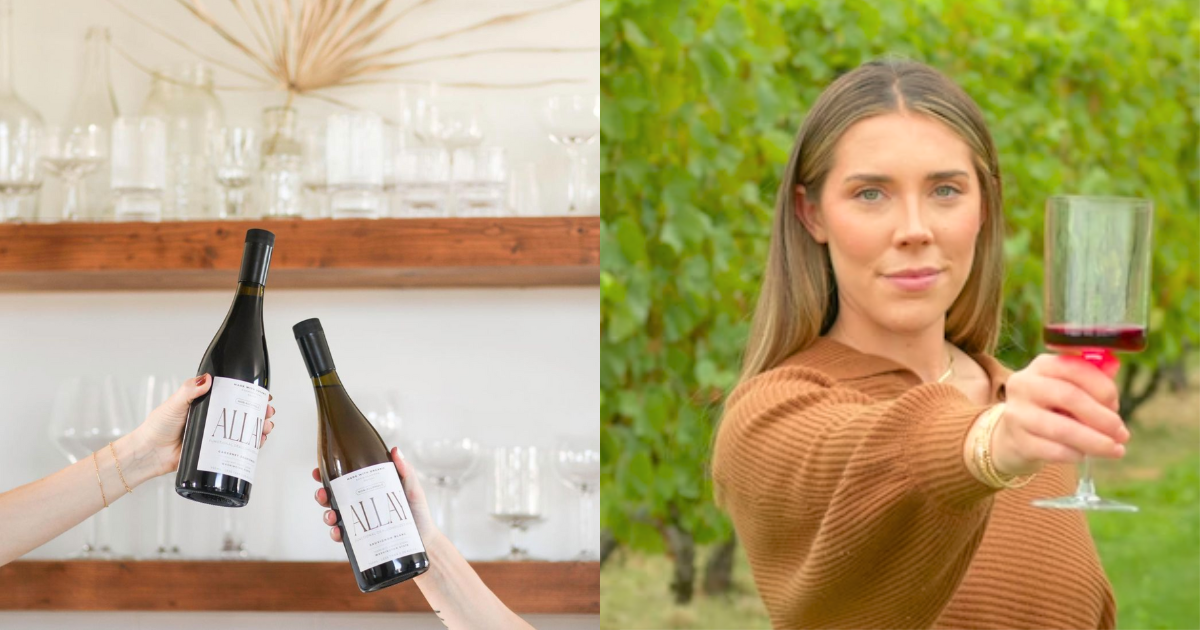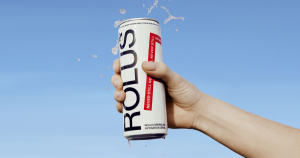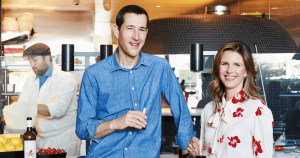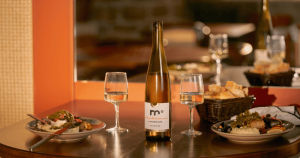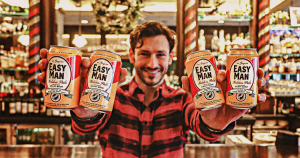Julia Borelli, Founder and CEO of Allay, was inspired to create a functional non-alcoholic wine during Dry January 2022. When she couldn’t find any options, she set out to make her own. In this Q+A, Julia discusses her product development journey, including overcoming the challenges of sourcing high quality ingredients, and hints at what’s next for Allay in 2024.
Take us back to Dry January 2022 when you realized there was a gap in the non-alcoholic market. What inspired you to fill that void?
I remember it being a stressful day of work and having conflicting emotions of being really proud of myself for going three or so weeks completely dry and not missing alcohol one bit, but also really craving something special to enjoy to wind down from the day. I started browsing the internet for alternatives and ended up purchasing some Kin Euphorics and a bottle of non-alcoholic cabernet off of Amazon. A couple days later when they arrived, I tried them and vividly remember being surprised by how relaxed I felt after drinking the Kin Euphorics, but was highly disappointed in the wine. So with that, I realized there wasn’t a high quality functional non-alcoholic wine out there and began the journey of creating my own!
You mentioned that many non-alcoholic wines were primarily grape juice concentrates and didn’t meet your taste expectations. How did you go about creating a delicious, quality non-alcoholic wine?
Based on my observations of the many non-alcoholic wines I tried over the course of developing our product, it became evident that a lot of brands out there were actually “wine alternatives” due to the main ingredient being a juice or juice concentrate instead of dealcoholized wine. There is absolutely nothing wrong with that, but, for me, it was important that wine was our first and main ingredient.
The spinning cone column technique is used to remove alcohol from Allay wine. Can you explain this technique and how it preserves flavor and quality?
There are a few different ways to remove alcohol from a product, but we opted for the spinning cone column technique because it’s considered the gold standard. It’s considered “the best” because it’s a more gentle process than the others, which means the product retains more of its flavor and aromas.
You mentioned that not including any chemicals or preservatives was a priority. Can you elaborate on any challenges here and how you’re overcoming them?
Yes, this was definitely our biggest hurdle in developing the product. Without getting too granular, we needed to figure out how to implement a kill step in the production process so that no harmful microorganisms can grow over time and we can be 110% confident in producing a safe product. Additionally, because our wine is made with organic grapes, we have to keep the SO2 levels under a certain threshold, which we were able to achieve with efficient supply chain strategies to minimize the risk of oxidation.
Tell us more about your functional ingredients like ashwagandha and reishi and how they contribute to the wine’s calming effects.
Ashwagandha and reishi fall under a category of herbs and plants called ‘adaptogens’ which have been shown to help our bodies manage stress and return to balance. I describe the effects as a “subtle sense of calm.” The reason for adding them to our formulation was to contribute to our overall mission of bringing wellness and indulgence together.
What are some of the challenges you’ve faced in sourcing organic and high quality ingredients for Allay?
Sourcing really anything over the past few years has been a challenge, but sourcing ingredients that meet our required standards and claims is even more challenging for sure. We actually had to push our initial production date out several times due to a few ingredients not arriving in time. Additionally, as all consumers can attest, purchasing organic comes with added costs and sometimes larger minimum order quantities.
One serving of Allay wine has significantly fewer calories and sulfites compared to conventional wine. Can you share more about the health benefits of choosing Allay?
My favorite topic! As I mentioned, we are really trying to bring wellness and indulgence together and give consumers the freedom to enjoy their typical rituals without compromise. With that, it was imperative for us to create a product that added both enjoyment and health benefits to our customers’ lives. As you noted, our wine has significantly less calories than conventional wine and less sulfites because it’s made with organic grapes. Additionally, the added functional ingredients and absence of alcohol have shown to provide numerous benefits, including improved heart health and immune function.
How do you plan to collect feedback from your first customers to refine your product and grow your brand?
We are consistently reaching out to our customers asking them to leave reviews with post-purchase emails. Additionally, we have sent out surveys to collect more in-depth data and information for the exact purpose of relentlessly improving our product and offerings. It’s SO important for us to hear from our customers and give them what they want! A brand is only as good as the people who support it.
The organic wine market is projected to more than double by 2026. How do you see non-alcoholic wines fitting into this trend?
I am very bullish on the non-alcoholic market as a whole and only see organic continuing to grow along with it. Younger generations are much more in tune with what they’re putting in their bodies.
What’s next for Allay? Are there any new products in the pipeline?
So, so much! We have endless ideas for the brand and are so excited to continue to grow. Whether that’s improving and iterating on existing products or launching new ones, there are a lot of exciting things in the works! Look out for some new products in 2024 🙂
___
Dry Atlas is your guide to the world of alcohol alternatives. We maintain the world’s largest directory of non-alcoholic spirits, wines, beers, and more to help you discover options you’ll love. We also publish High Spirits, the weekly newsletter that helps open-minded drinkers like you learn more about non-alc. Our goal is to demystify alcohol alternatives so you can navigate them with ease to pursue a happier, healthier life.


